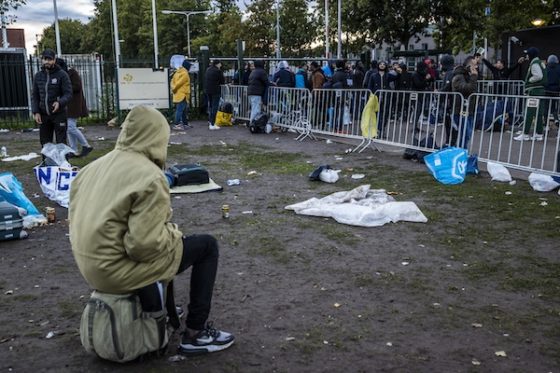Inspectors again slam conditions at Ter Apel refugee centre


Government inspectors have again slammed conditions at the Ter Apel refugee reception in Groningen, and warned that babies and the elderly risk developing health problems.
Inspectors visited the centre last week and found people sitting too close to each other in ‘a cold, draughty and dirty sports hall’. In August, a three-month old baby died in the sports hall which is used as an overspill centre for new arrivals.
Despite earlier warnings, there are still too few showers and toilets available for the hundreds of people waiting in the hall, the toilets were dirty and there was insufficient medical supervision, the inspectors said.
In addition, at least 300 youngsters were waiting in the sports hall without parents, when Ter Apel is only equipped to cope with 55 unaccompanied minors. This is the second time this year inspectors have sounded the alarm about young refugees who have come to the Netherlands alone.
The inspectors also reported back on the situation outside the centre, where hundreds of people have been sleeping outdoors in an effort not to lose their place in the queue to apply for asylum.
‘People in the queue are predominantly wearing summer clothes and flip flops. It was clear that they were cold and numb,’ the inspectors said.
Children’s charity Unicef has also sounded the alarm, saying that the situation facing children at the centre had further worsened in recent weeks.
In addition, children all over the country are being moved from one emergency centre to another. ‘Situations like this are causing great stress and uncertainty to children, who have no idea where they will live or go to school,’ Unicef said.
Housing crisis
The main reason for the overcrowding at Ter Apel is the lack of regular accommodation for refugees who have been granted residency status in the Netherlands. Some 17,000 people are still sleeping in refugee centres even though they should have moved into proper housing.
Although many local councils have been reluctant to act, church organisations in the Netherlands say they can now provide accommodation for 8,500 to 10,000 refugees who have been given a residence permit.
The refugees will be housed in holiday parks and empty church buildings in an effort to ease the pressure on established refugee centres.
Dublin agreement
Meanwhile, broadcaster NOS reported on Monday that some 3,500 refugees currently living in Dutch centres should be making their requests in other EU countries under the Dublin agreement. That agreement states that refugees should apply for asylum in the first EU country they set foot in.
However, only 20% are ever sent back to make a claim for refugee status in another EU country and may of the rest disappear into illegality, NOS said.
In the first eight months of this year, the Netherlands requested that 6760 refugees be returned to another EU country but only 370 have actually gone.
They cannot be sent back to Greece, Croatia or Malta after courts ruled that conditions in those countries were too bad.
Thank you for donating to DutchNews.nl.
We could not provide the Dutch News service, and keep it free of charge, without the generous support of our readers. Your donations allow us to report on issues you tell us matter, and provide you with a summary of the most important Dutch news each day.
Make a donation